Our little basil plant finally started to feel the effects of the fall weather, so on Sunday I decided to make one last batch of pesto.
I don’t really like to use a concrete recipe when I make pesto, (or anything for that matter) because it’s difficult to judge how much basil you will end up with once you’re finished picking the leaves from the stems and blanching it. I started out with a small colander full of basil, and after I blanched it and squeezed out the water, I was left with a bit less than a cup of basil.
To blanch the basil (and yes, you need to, unless you like your pesto brown) just give it a rinse, plunge it in a pot of boiling water, let it sit for about ten seconds, and use a spider or a slotted spoon to transfer it to a bowl of icy water. Then wring it out in a colander. BONUS: the pot and bowl you use for blanching don’t really get dirty, so rinse them out and put them away. Unless you like doing dishes. I’m not gross, you’re gross.
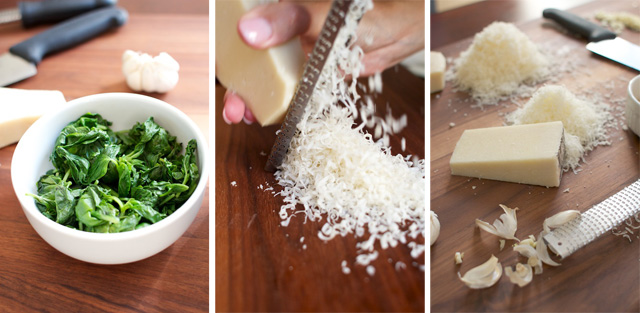
Anyway, once you have your basil blanched and ready it’s time to gather the other components.
You’ll need:
-as much basil as you can get, picked from stems and blanched – Like I said, my small colander of fresh basil ended up being about 3/4 cup after blanching and wringing.
-some parmesan cheese – I used about a cup and a half grated with a microplane (which means it’s pretty fluffy). More is fine, less is also fine.
-some pecorino romano cheese – About half as much pecorino as parmesan.
-some olive oil – I used about 1/2 cup total. You’re looking for a consistency though, not a measurement. I used extra virgin and vegetable oil, because I thought the extra virgin alone might be too fruity. You can use regular olive oil, all extra virgin, or a mix of extra virgin and something more neutral. You do want it to taste like olive oil though.
-a few garlic cloves – I used 3 to start and added another one after tasting the finished product. That’s 4 total. Watch out for garlic that has sprouted or looks green in the center, because it will taste bitter. If it’s all you have, remove the green parts and you’ll be fine.
-some toasted nuts – I used about 1/3 cup. Traditionally, pesto uses pine nuts. I think pine nuts taste pretty “pine-y”, so I used a mix of pine nuts and almonds. Ina Garten (aka the Barefoot Contessa) uses pine nuts and walnuts. Just steer clear of hazelnuts. That would probably be weird. Toast in a 400 degree oven for about 5 minutes, you just want them golden and smelly-good.
-kosher salt – To taste.
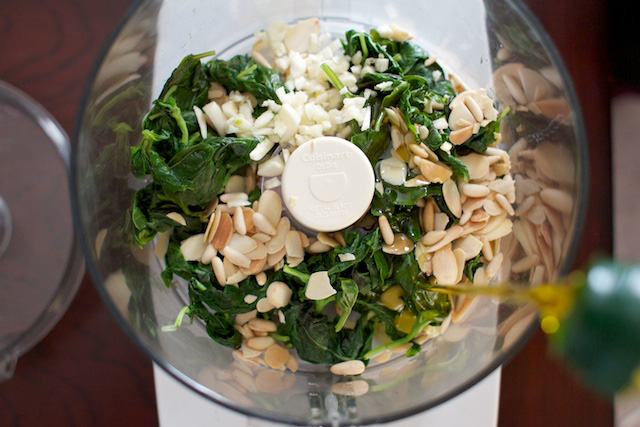
Start by putting your blanched basil, toasted nuts, garlic (I rough-chopped mine, but it’s not necessary) into the bowl of your food processor with some oil. The oil will help the ingredients stick together in the bottom of the bowl where the blades can do their job. Then give it a few pulses and see how it looks.
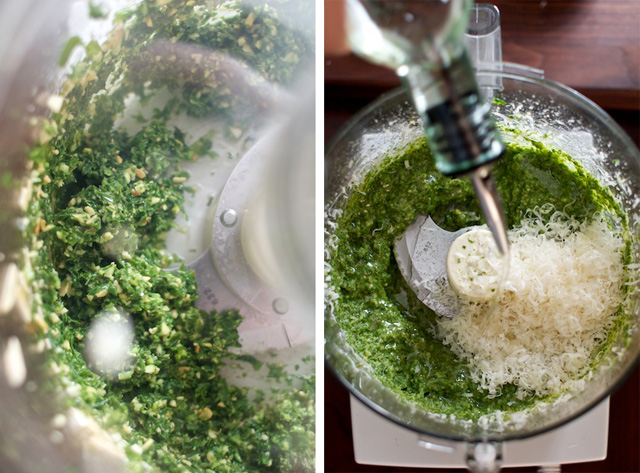
The pesto on the left is dry and there are bits of garlic and almonds flinging around. I scraped down the sides and added more oil and things settled down. Once the mixture is the right consistency, add your cheese. The cheese may dry it out a bit more, so add more oil if necessary.
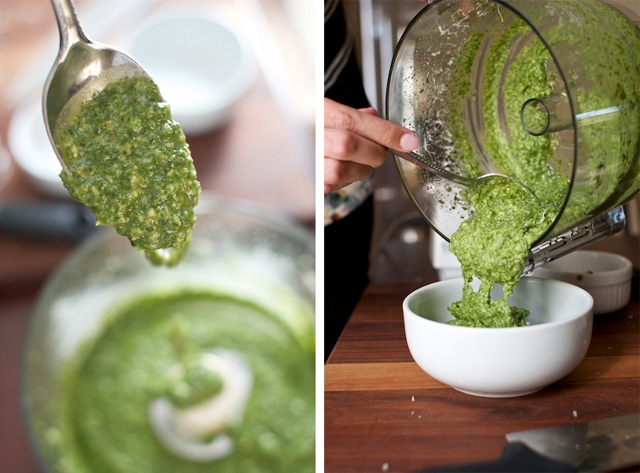
This is the consistency you’re looking for. Spreadable without being super runny. Though, in honesty, if it ends up too runny it will still taste awesome. Pesto is forgiving. Then all you have left to do is taste it and salt it and taste it again until it’s just the way you like it.
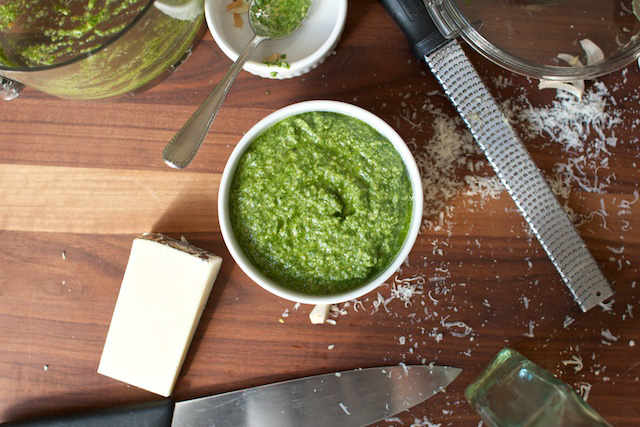
Look how pretty and green it is! Seriously, if you’re used to eating pesto from a jar, this will blow your mind. I love pesto in and on everything. I put it in scrambled eggs, on toast, on pasta, in lasagna, on sandwiches and in salads. It’s pretty much a wonder-condiment. It also freezes really well, so I could put some away to enjoy a bit later in the season. But I won’t.
I can feel some of you clenching over the fact that this isn’t exactly a recipe, but pesto (among other dishes) is more about proportions and personal tastes than measurement, especially when the basil, i.e. the core ingredient, is so variable. The important thing is to TASTE it! Your taste buds won’t lie to you. When you’re happy with the taste, you’re done.
Thanks for the tip on the blanching! The color is beautiful. Did you take the pictures yourself?
Caroline — October 22, 2011I'm just full of tips. And no, Cody definitely took the pictures. He's the talented one.
courtney — October 22, 2011It really is beautiful! And you both have many talents!
Carrie — October 22, 2011